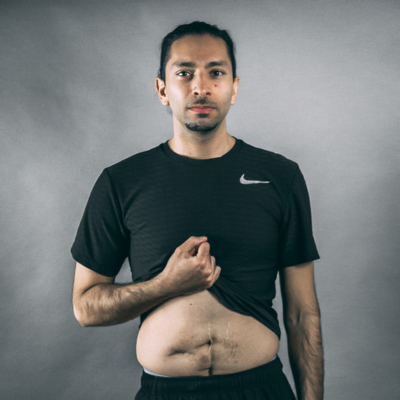World IBD Day, May 19 is circled in Rasheed Clarke’s calendar in 2024. He will run the Bluenose half marathon in Halifax, a race he had been planning to run 17 years ago.
In 2007, Rasheed was living in Halifax and training for the half marathon. Out of nowhere, he was dealing with the sudden need to go to the bathroom 20-30 times per day as well as blood in his stool. Doctor visits followed. By the time he started medication to address his symptoms, the run had taken place.
He thought he had dodged a bullet, but in fall 2008 his symptoms reappeared. This led to a difficult road of colonoscopies, tests, the trial and error of different medications, and ultimately a diagnosis of colitis.
Rasheed’s health remained relatively stable until 2013 when his medication stopped working. He weighed his options and decided to proceed with a surgery to remove his colitis-ravaged colon. A pouch was created in his abdomen, called a J-pouch, whereby the end of his small intestine was turned into a J-shaped pouch, then reattached to the anus. An ostomy, a surgically created hole in his abdomen to allow stool to leave the body, was also created to give the J-pouch time to heal. Initially, he was supposed to have the ostomy for three months, but because of complications and increased healing time, he ended up living with it for nine months.
In 2014, Rasheed underwent a second surgery to have his ostomy reversed and have his J-pouch start storing and passing stool. A six-month period of learning to go to the bathroom again followed. Now, because of his J-pouch, incontinence is no longer an issue. The surgery has been life changing.
Before his surgery, Rasheed found an ally in Crohn’s and Colitis Canada to learn about treatment options, and what his future could look like. He went on to volunteer in 2014, which allowed him to meet caregivers, parents, and those living with these diseases. From 2016-2018, Rasheed worked at Crohn’s and Colitis Canada’s office in Toronto as a marketing specialist, helping raise awareness.
Another essential part of his journey has been connecting with others going through the same thing. He initially went five years without talking to someone else with colitis. Before his 2013 surgery at Mount Sinai Hospital in Toronto, he joined a support group. He says: “It was a relief to talk to others who have been through it and not have to explain yourself.”
Since his 2014 surgery, he has been off all medications and has not required any hospitalizations. He lives as normally as possible — running, cycling, hiking, and spending time in nature.
He says: “Here we are in 2024, I’ve lived a decade in pretty good shape thanks to that J-pouch, but that race that went un-run has remained on my mind.”
He is returning to finish what he started. This time, it is more than just a run. He is fundraising for the organizations that have been integral role in his journey - Crohn’s and Colitis Canada Mount Sinai Hospital in Toronto.

Written by Tavin Smith, RN